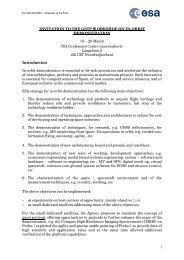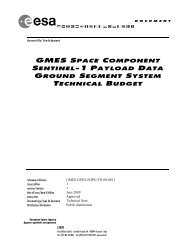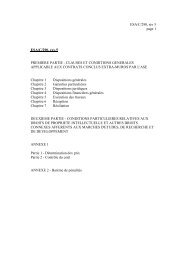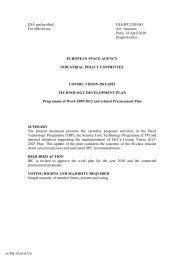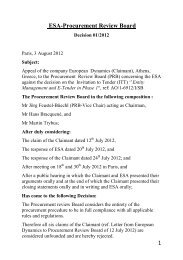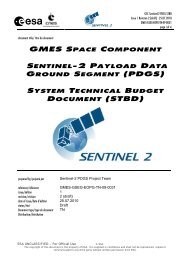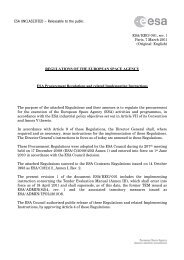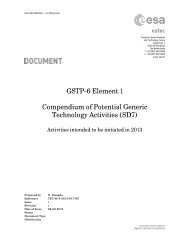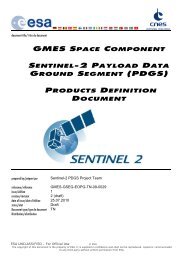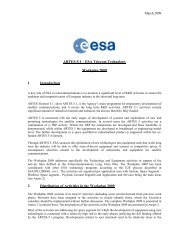- Page 1 and 2:
document title/ titre du document P
- Page 3 and 4:
GSC Sentinel-2 PDGS OCD issue 1 rev
- Page 5 and 6:
GSC Sentinel-2 PDGS OCD issue 1 rev
- Page 7 and 8:
GSC Sentinel-2 PDGS OCD issue 1 rev
- Page 9 and 10:
GSC Sentinel-2 PDGS OCD issue 1 rev
- Page 11 and 12:
GSC Sentinel-2 PDGS OCD issue 1 rev
- Page 13 and 14:
GSC Sentinel-2 PDGS OCD issue 1 rev
- Page 15 and 16:
GSC Sentinel-2 PDGS OCD issue 1 rev
- Page 17 and 18:
GSC Sentinel-2 PDGS OCD issue 1 rev
- Page 19 and 20:
GSC Sentinel-2 PDGS OCD issue 1 rev
- Page 21 and 22:
GSC Sentinel-2 PDGS OCD issue 1 rev
- Page 23 and 24:
GSC Sentinel-2 PDGS OCD issue 1 rev
- Page 25 and 26:
GSC Sentinel-2 PDGS OCD issue 1 rev
- Page 27 and 28:
GSC Sentinel-2 PDGS OCD Issue 1 Rev
- Page 29 and 30:
GSC Sentinel-2 PDGS OCD Issue 1 Rev
- Page 31 and 32:
GSC Sentinel-2 PDGS OCD Issue 1 Rev
- Page 33 and 34:
[RD-33] Sentinel-2 MSI - Level 2A A
- Page 35 and 36:
GSC Sentinel-2 PDGS OCD Issue 1 Rev
- Page 37 and 38:
LES LGS Land Equipped Sites Local G
- Page 39 and 40:
GSC Sentinel-2 PDGS OCD Issue 1 Rev
- Page 41 and 42:
GSC Sentinel-2 PDGS OCD Issue 1 Rev
- Page 43 and 44:
GSC Sentinel-2 PDGS OCD Issue 1 Rev
- Page 45 and 46:
GSC Sentinel-2 PDGS OCD Issue 1 Rev
- Page 47 and 48:
3.5.2 MULTI-SPECTRAL INSTRUMENT CHA
- Page 49 and 50:
GSC Sentinel-2 PDGS OCD Issue 1 Rev
- Page 51 and 52:
GSC Sentinel-2 PDGS OCD Issue 1 Rev
- Page 53 and 54:
GSC Sentinel-2 PDGS OCD Issue 1 Rev
- Page 55 and 56:
GSC Sentinel-2 PDGS OCD Issue 1 Rev
- Page 57 and 58:
GSC Sentinel-2 PDGS OCD Issue 1 Rev
- Page 59 and 60:
GSC Sentinel-2 PDGS OCD Issue 1 Rev
- Page 61 and 62:
GSC Sentinel-2 PDGS OCD Issue 1 Rev
- Page 63 and 64:
GSC Sentinel-2 PDGS OCD Issue 1 Rev
- Page 65 and 66:
GSC Sentinel-2 PDGS OCD Issue 1 Rev
- Page 67 and 68:
ESA UNCLASSIFIED - For Official Use
- Page 69 and 70:
GSC Sentinel-2 PDGS OCD Issue 1 Rev
- Page 71 and 72:
ESA UNCLASSIFIED - For Official Use
- Page 73 and 74:
GSC Sentinel-2 PDGS OCD Issue 1 Rev
- Page 75 and 76:
GSC Sentinel-2 PDGS OCD Issue 1 Rev
- Page 77 and 78:
GSC Sentinel-2 PDGS OCD Issue 1 Rev
- Page 79 and 80:
GSC Sentinel-2 PDGS OCD Issue 1 Rev
- Page 81 and 82:
ESA UNCLASSIFIED - For Official Use
- Page 83 and 84:
GSC Sentinel-2 PDGS OCD Issue 1 Rev
- Page 85 and 86:
GSC Sentinel-2 PDGS OCD Issue 1 Rev
- Page 87 and 88:
GSC Sentinel-2 PDGS OCD Issue 1 Rev
- Page 89 and 90:
GSC Sentinel-2 PDGS OCD Issue 1 Rev
- Page 91 and 92:
GSC Sentinel-2 PDGS OCD Issue 1 Rev
- Page 93 and 94:
GSC Sentinel-2 PDGS OCD Issue 1 Rev
- Page 95 and 96:
GSC Sentinel-2 PDGS OCD Issue 1 Rev
- Page 97 and 98:
Table 4-5 Radiometric image quality
- Page 99 and 100:
Product- Type On-Line retention Off
- Page 101 and 102:
ESA UNCLASSIFIED - For Official Use
- Page 103 and 104:
4.5.1.5 Scalability and Flexibility
- Page 105 and 106:
GSC Sentinel-2 PDGS OCD Issue 1 Rev
- Page 107 and 108:
GSC Sentinel-2 PDGS OCD Issue 1 Rev
- Page 109 and 110:
GSC Sentinel-2 PDGS OCD Issue 1 Rev
- Page 111 and 112:
GSC Sentinel-2 PDGS OCD Issue 1 Rev
- Page 113 and 114:
ESA UNCLASSIFIED - For Official Use
- Page 115 and 116:
GSC Sentinel-2 PDGS OCD Issue 1 Rev
- Page 117 and 118:
GSC Sentinel-2 PDGS OCD Issue 1 Rev
- Page 119 and 120:
GSC Sentinel-2 PDGS OCD Issue 1 Rev
- Page 121 and 122:
GSC Sentinel-2 PDGS OCD Issue 1 Rev
- Page 123 and 124:
GSC Sentinel-2 PDGS OCD Issue 1 Rev
- Page 125 and 126:
GSC Sentinel-2 PDGS OCD Issue 1 Rev
- Page 127 and 128:
GSC Sentinel-2 PDGS OCD Issue 1 Rev
- Page 129 and 130:
GSC Sentinel-2 PDGS OCD Issue 1 Rev
- Page 131 and 132:
GSC Sentinel-2 PDGS OCD Issue 1 Rev
- Page 133 and 134:
ESA UNCLASSIFIED - For Official Use
- Page 135 and 136:
GSC Sentinel-2 PDGS OCD Issue 1 Rev
- Page 137 and 138:
GSC Sentinel-2 PDGS OCD Issue 1 Rev
- Page 139 and 140:
GSC Sentinel-2 PDGS OCD Issue 1 Rev
- Page 141 and 142:
GSC Sentinel-2 PDGS OCD Issue 1 Rev
- Page 143 and 144:
GSC Sentinel-2 PDGS OCD Issue 1 Rev
- Page 145 and 146:
GSC Sentinel-2 PDGS OCD Issue 1 Rev
- Page 147 and 148:
ESA UNCLASSIFIED - For Official Use
- Page 149 and 150:
GSC Sentinel-2 PDGS OCD Issue 1 Rev
- Page 151 and 152:
GSC Sentinel-2 PDGS OCD Issue 1 Rev
- Page 153 and 154:
GSC Sentinel-2 PDGS OCD Issue 1 Rev
- Page 155 and 156:
GSC Sentinel-2 PDGS OCD Issue 1 Rev
- Page 157 and 158:
GSC Sentinel-2 PDGS OCD Issue 1 Rev
- Page 159 and 160:
4.6.3 OPERATIONAL TRANSFER BASELINE
- Page 161 and 162:
GSC Sentinel-2 PDGS OCD Issue 1 Rev
- Page 163 and 164:
ESA UNCLASSIFIED - For Official Use
- Page 165 and 166:
GSC Sentinel-2 PDGS OCD Issue 1 Rev
- Page 167 and 168:
GSC Sentinel-2 PDGS OCD Issue 1 Rev
- Page 169 and 170:
GSC Sentinel-2 PDGS OCD Issue 1 Rev
- Page 171 and 172:
GSC Sentinel-2 PDGS OCD Issue 1 Rev
- Page 173 and 174:
GSC Sentinel-2 PDGS OCD Issue 1 Rev
- Page 175 and 176:
GSC Sentinel-2 PDGS OCD Issue 1 Rev
- Page 177 and 178:
Product- Type Identifier S2MSI0 S2M
- Page 179 and 180:
GSC Sentinel-2 PDGS OCD Issue 1 Rev
- Page 181 and 182:
GSC Sentinel-2 PDGS OCD Issue 1 Rev
- Page 183 and 184:
ESA UNCLASSIFIED - For Official Use
- Page 185 and 186:
GSC Sentinel-2 PDGS OCD Issue 1 Rev
- Page 187 and 188:
GSC Sentinel-2 PDGS OCD Issue 1 Rev
- Page 189 and 190:
GSC Sentinel-2 PDGS OCD Issue 1 Rev
- Page 191 and 192:
5 PDGS DESIGN GSC Sentinel-2 PDGS O
- Page 193 and 194:
GSC Sentinel-2 PDGS OCD Issue 1 Rev
- Page 195 and 196:
GSC Sentinel-2 PDGS OCD Issue 1 Rev
- Page 197 and 198:
ESA UNCLASSIFIED - For Official Use
- Page 199 and 200:
GSC Sentinel-2 PDGS OCD Issue 1 Rev
- Page 201 and 202:
GSC Sentinel-2 PDGS OCD Issue 1 Rev
- Page 203 and 204:
ESA UNCLASSIFIED - For Official Use
- Page 205 and 206:
ESA UNCLASSIFIED - For Official Use
- Page 207 and 208:
○ Effective processing resources
- Page 209 and 210:
GSC Sentinel-2 PDGS OCD Issue 1 Rev
- Page 211 and 212:
ESA UNCLASSIFIED - For Official Use
- Page 213 and 214:
GSC Sentinel-2 PDGS OCD Issue 1 Rev
- Page 215 and 216:
GSC Sentinel-2 PDGS OCD Issue 1 Rev
- Page 217 and 218:
GSC Sentinel-2 PDGS OCD Issue 1 Rev
- Page 219 and 220:
GSC Sentinel-2 PDGS OCD Issue 1 Rev
- Page 221 and 222:
GSC Sentinel-2 PDGS OCD Issue 1 Rev
- Page 223 and 224:
ESA UNCLASSIFIED - For Official Use
- Page 225 and 226:
GSC Sentinel-2 PDGS OCD Issue 1 Rev
- Page 227 and 228:
GSC Sentinel-2 PDGS OCD Issue 1 Rev
- Page 229 and 230:
GSC Sentinel-2 PDGS OCD Issue 1 Rev
- Page 231 and 232:
o preserving integrity of exchanged
- Page 233 and 234:
GSC Sentinel-2 PDGS OCD Issue 1 Rev
- Page 235 and 236: GSC Sentinel-2 PDGS OCD Issue 1 Rev
- Page 237 and 238: GSC Sentinel-2 PDGS OCD Issue 1 Rev
- Page 239 and 240: GSC Sentinel-2 PDGS OCD Issue 1 Rev
- Page 241 and 242: GSC Sentinel-2 PDGS OCD Issue 1 Rev
- Page 243 and 244: 6 DETAILED OPERATIONS CONCEPTS GSC
- Page 245 and 246: o Report generation frequency and c
- Page 247 and 248: GSC Sentinel-2 PDGS OCD Issue 1 Rev
- Page 249 and 250: GSC Sentinel-2 PDGS OCD Issue 1 Rev
- Page 251 and 252: ○ MSI L1A, L1B, L1C and TCI produ
- Page 253 and 254: GSC Sentinel-2 PDGS OCD Issue 1 Rev
- Page 255 and 256: GSC Sentinel-2 PDGS OCD Issue 1 Rev
- Page 257 and 258: GSC Sentinel-2 PDGS OCD Issue 1 Rev
- Page 259 and 260: GSC Sentinel-2 PDGS OCD Issue 1 Rev
- Page 261 and 262: ESA UNCLASSIFIED - For Official Use
- Page 263 and 264: GSC Sentinel-2 PDGS OCD Issue 1 Rev
- Page 265 and 266: GSC Sentinel-2 PDGS OCD Issue 1 Rev
- Page 267 and 268: GSC Sentinel-2 PDGS OCD Issue 1 Rev
- Page 269 and 270: GSC Sentinel-2 PDGS OCD Issue 1 Rev
- Page 271 and 272: GSC Sentinel-2 PDGS OCD Issue 1 Rev
- Page 273 and 274: GSC Sentinel-2 PDGS OCD Issue 1 Rev
- Page 275 and 276: GSC Sentinel-2 PDGS OCD Issue 1 Rev
- Page 277 and 278: ESA UNCLASSIFIED - For Official Use
- Page 279 and 280: GSC Sentinel-2 PDGS OCD Issue 1 Rev
- Page 281 and 282: ESA UNCLASSIFIED - For Official Use
- Page 283 and 284: GSC Sentinel-2 PDGS OCD Issue 1 Rev
- Page 285: GSC Sentinel-2 PDGS OCD Issue 1 Rev
- Page 289 and 290: Some relevant use cases are present
- Page 291 and 292: GSC Sentinel-2 PDGS OCD Issue 1 Rev
- Page 293 and 294: GSC Sentinel-2 PDGS OCD Issue 1 Rev
- Page 295 and 296: GSC Sentinel-2 PDGS OCD Issue 1 Rev
- Page 297 and 298: GSC Sentinel-2 PDGS OCD Issue 1 Rev
- Page 299 and 300: GSC Sentinel-2 PDGS OCD Issue 1 Rev
- Page 301 and 302: GSC Sentinel-2 PDGS OCD Issue 1 Rev
- Page 303 and 304: GSC Sentinel-2 PDGS OCD Issue 1 Rev
- Page 305 and 306: GSC Sentinel-2 PDGS OCD Issue 1 Rev
- Page 307 and 308: ESA UNCLASSIFIED - For Official Use
- Page 309 and 310: GSC Sentinel-2 PDGS OCD Issue 1 Rev
- Page 311 and 312: GSC Sentinel-2 PDGS OCD Issue 1 Rev
- Page 313 and 314: GSC Sentinel-2 PDGS OCD Issue 1 Rev
- Page 315 and 316: GSC Sentinel-2 PDGS OCD Issue 1 Rev
- Page 317 and 318: GSC Sentinel-2 PDGS OCD Issue 1 Rev
- Page 319 and 320: GSC Sentinel-2 PDGS OCD Issue 1 Rev
- Page 321 and 322: GSC Sentinel-2 PDGS OCD Issue 1 Rev
- Page 323 and 324: GSC Sentinel-2 PDGS OCD Issue 1 Rev
- Page 325 and 326: Two main mapping services have been
- Page 327 and 328: The requirement on the cloud covera
- Page 329 and 330: GSC Sentinel-2 PDGS OCD Issue 1 Rev
- Page 331 and 332: GSC Sentinel-2 PDGS OCD Issue 1 Rev
- Page 333 and 334: GSC Sentinel-2 PDGS OCD Issue 1 Rev
- Page 335 and 336: GSC Sentinel-2 PDGS OCD Issue 1 Rev
- Page 337 and 338:
GSC Sentinel-2 PDGS OCD Issue 1 Rev
- Page 339 and 340:
GSC Sentinel-2 PDGS OCD Issue 1 Rev
- Page 341 and 342:
GSC Sentinel-2 PDGS OCD Issue 1 Rev
- Page 343 and 344:
GSC Sentinel-2 PDGS OCD Issue 1 Rev
- Page 345 and 346:
GSC Sentinel-2 PDGS OCD Issue 1 Rev



